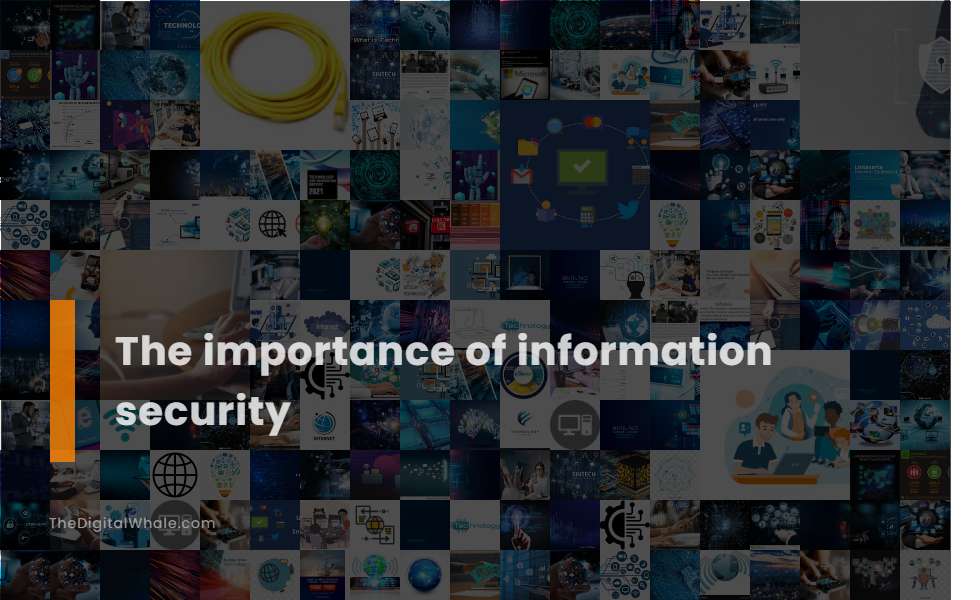The Importance of Information Security
What is the significance of information systems security in businesses? What are some of the benefits of having an information security strategy in place? Let's find out more about The Importance of Information Security.

Protecting sensitive personal and business data
Data protection is crucial for safeguarding sensitive personal and business data by ensuring confidentiality, integrity, and availability. It serves as a frontline defense against cyber threats, maintaining trust with stakeholders and complying with privacy regulations. To ensure comprehensive security, organizations must also focus on Data Security, which protects digital information from unauthorized access, corruption, or theft throughout its entire lifecycle. This involves implementing physical, administrative, and logical security measures to guard against cybercriminal activities, insider threats, and human error. Both data protection and data security are essential components in maintaining the safety and reliability of information systems.
Preventing cyber attacks and data breaches
Information security is crucial for preventing cyber attacks and data breaches, as it protects sensitive data, ensures business continuity, and prevents disruptions such as denial-of-service attacks, thereby safeguarding the integrity and confidentiality of organizational data. To prevent data breaches, businesses must implement measures like regular software updates, strong password policies, employee training, encryption, and access controls, as well as having a thorough incident response plan to minimize the risk and severity of breaches. For a comprehensive guide on data breach prevention, visit Alliant's website to explore essential practices and strategies.
Maintaining business continuity and system integrity
Information Security Continuity is crucial for maintaining business continuity by ensuring the protection and accessibility of vital information assets even during unforeseen events, and it is integrated with system integrity through frameworks like ISO/IEC 27001:2022, which require processes to restore critical information systems after disruptions. Strong information security is essential for protecting sensitive data, preventing cyber attacks, and ensuring business continuity, thereby maintaining system integrity and providing stakeholders with confidence in the organization's ability to safeguard critical information. For further insights into this topic, consider exploring the Information Security Continuity framework and its impact on business resilience.
Safeguarding client and customer information
Safeguarding client and customer information is crucial for maintaining trust, complying with legal regulations, and protecting against identity theft and other cyber threats. This involves strategies such as implementing cybersecurity measures, encrypting sensitive data, and limiting access to authorized personnel. For more detailed insights on customer data protection, visit the Help Desk Migration website for comprehensive strategies and advice.
Ensuring compliance with regulatory laws (GDPR, HIPAA, HITECH)
Ensuring compliance with regulatory laws such as GDPR, HIPAA, and HITECH is crucial for protecting sensitive data, avoiding legal penalties and reputational damage, and establishing trust with customers and stakeholders by implementing standardized security practices and robust data protection measures. These regulations mandate specific security safeguards, risk assessments, and data governance policies to mitigate cybersecurity risks and ensure the integrity of sensitive information. For more detailed insights, explore the concept of Regulatory Compliance to understand how such frameworks protect your enterprise.
Related:
Can we remove personal or identifying information from social media profiles of our children's friends? What are some tips for staying safe on social media? Let's find out more about How To Safely Use Social Networking Sites.
Boosting productivity by minimizing downtime
Minimizing downtime is crucial for boosting productivity as it ensures continuous access to critical systems and data, reduces disruptions, and maintains employee focus on delivering value rather than troubleshooting problems, thereby preventing revenue losses and safeguarding the company's reputation. For more insights on this topic, you can visit the Arcserve website which elaborates on causes of downtime and effective prevention strategies.
Maintaining brand reputation and customer trust
Maintaining strong cybersecurity practices is crucial for protecting customer data, building trust, and enhancing brand reputation, as it demonstrates a commitment to safeguarding sensitive information and prevents data breaches that can damage a company's reputation and lose customer trust. This is particularly important in today's digital age, where the risk of cyber threats is ever-increasing. For more detailed insights on why cybersecurity is an essential aspect of brand management, consider visiting the Matchbox Design Group Blog, which offers valuable information on how to implement effective cybersecurity measures. By prioritizing cybersecurity, businesses not only protect their customers but also fortify their market position against potential risks and reputational harm.
Protecting national security interests
Protecting National Security interests through information security involves a robust legal and oversight framework, including laws like the Foreign Intelligence Surveillance Act (FISA) and Executive Order 12333, which regulate the collection, retention, and dissemination of foreign intelligence to safeguard against threats such as terrorism, cyber attacks, and espionage while ensuring privacy protections. For more detailed insights and updates on these frameworks, you can visit the Intelligence.gov website which offers substantial information on privacy, technology, and national security integration.
Mitigating risks from malware, ransomware, and social engineering
Mitigating risks from malware, ransomware, and social engineering requires implementing robust cybersecurity measures such as firewalls, anti-virus software, and email filtering systems, as well as regular software updates and comprehensive employee training and awareness programs. It's essential to adopt a multi-layered approach that includes endpoint security, strong passwords, and continuous monitoring. Additionally, using Threat Intelligence can significantly enhance the ability to identify and mitigate potential risks before they occur, ensuring a more secure digital environment.
Optimizing access control and employee training on cyber threats
Optimizing access control and employee training on cyber threats is crucial as it involves implementing identity and access management systems to define roles and access privileges. Providing regular security awareness training to educate employees on spotting and mitigating cyber threats, such as phishing and ransomware, is essential to protect the organization's data and systems. For more insights, refer to Cybersecurity, which elaborates on the strategies to enhance digital security effectively.
Related:
What are some ways we use technology to stay in touch with people? What are some ways technology can improve our connection to each other? Let's find out more about Connecting with Others Through Technology.
